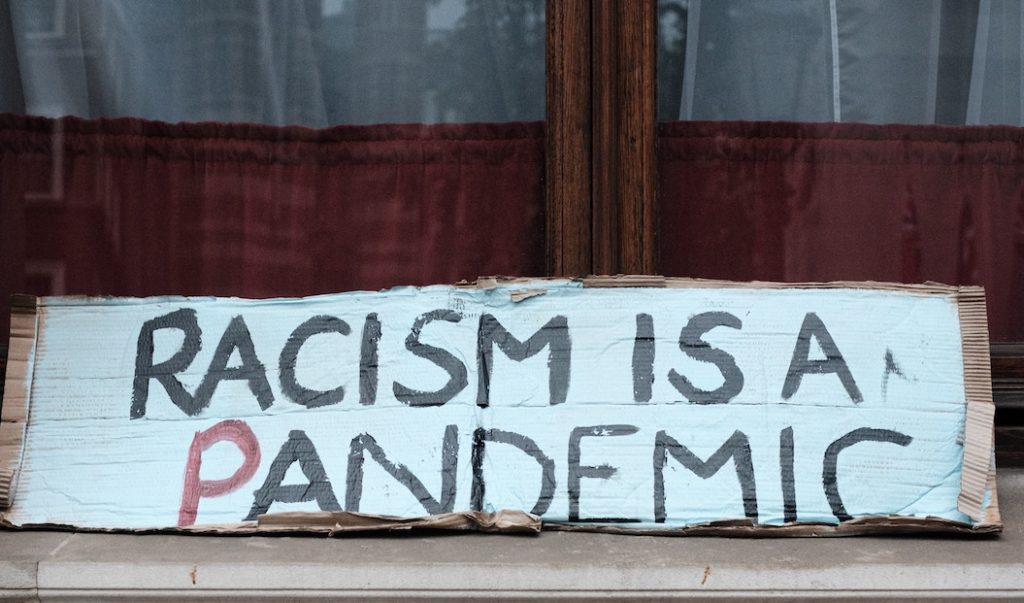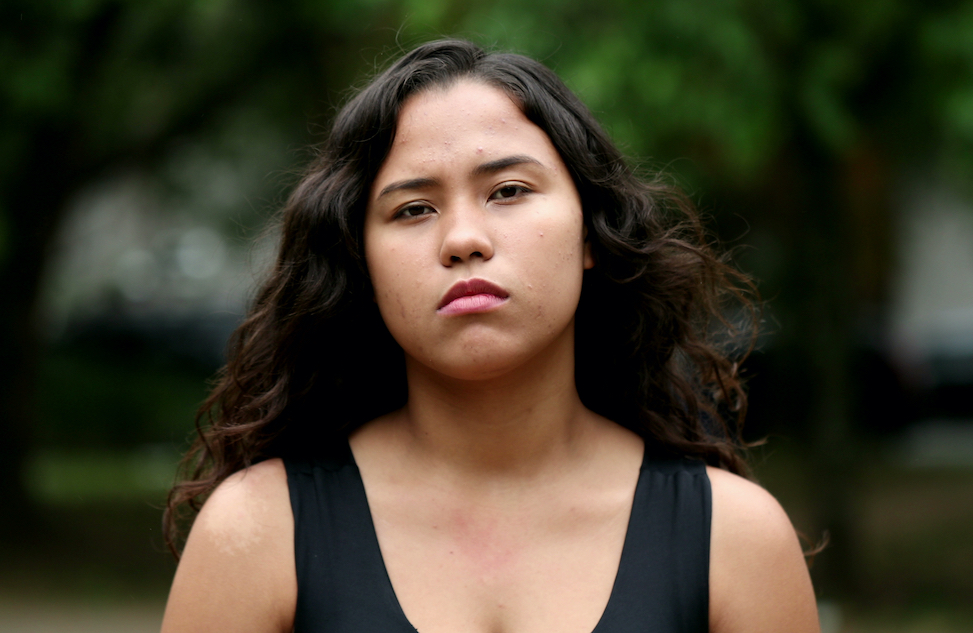the toll on mental health

Racial and ethnic discrimination is a deeply entrenched issue in America, dating back to its colonial past. The COVID-19 pandemic sparked a sharp rise in racially-motivated attacks. Many groups faced structural racism, with online abuse towards Asian communities after President Trump named it the “Chinese virus” (Wang et al., 2022) and the tragic killings of George Floyd and Breonna Taylor marking the period and leading to global outrage.
The American Psychological Association define discrimination as “the unfair or prejudicial treatment of people and groups based on characteristics such as race, gender, age, or sexual orientation.” (APA, 2022). Several different groups face discrimination in the US. Based on a 2021 survey of c.12,000 adults, 80% of Americans say Black people face some degree of discrimination, 76% say Hispanic people are discriminated against and 70% have noticed discrimination against Asian people (Daniller, 2021). Examples of communities that face structural racism in the United States: American Indian and Alaska Natives, Asian, Black, Hispanic or Latino, and Pacific Islanders. >60% of Asian Americans and Pacific Islanders reported experiencing discrimination during the pandemic, in one US-wide multilingual survey (Ta Park et al., 2022). Non-Hispanic White people have historically had higher rates of suicide, but these rates declined over the pandemic period and increased for non-Hispanic Black and Hispanic people (Curtin et al., 2022).
Prior to the pandemic, the negative consequences of discrimination on physical and mental health in Asian, Black and Hispanic or Latino populations was already well documented (Paradies et al., 2015). The pandemic compounded stresses and inequalities they already faced – high rates of unemployment, food and housing insecurity, and barriers to accessing care (Galea, 2020), along with higher rates on infection, hospitalisation and loss of life (Abedi et al., 2021).
The present study sought to shed light on the impact of everyday discrimination on mental health in the US in early pandemic days. The investigators explored:
- Whether increased levels of everyday discrimination led to a higher chance of individuals suffering from depression or suicidal ideation
- What factors might be influencing this link
- Whether this association changed with survey timings.

Asian, African and Latinx communities in the United States face higher rates of discrimination. What was the impact on mental health during the pandemic?
Methods
The authors carried out a large-scale, long-term study in which repeated surveys were completed in the early months of the pandemic on a sample from the ‘All of Us Research Program’. For those of you not familiar with this, the ‘All of Us Research Program’ generates novel ways to use data, is open to all adults in the US, and aims to make research results accessible to participants (Special Report, 2019).
This study was designed to look at the same group of individuals and find out if any changes occurred over time. A survey developed by the program called COPE (Covid-19 Participant Experience) was provided online to all participants, which included questionnaires to measure the impact of the COVID-19 pandemic on physical and mental health.
The COPE survey used previously validated tools including the Everyday Discrimination Scale to capture subjective experiences of daily discrimination and the Patient Health Questionnaire (PHQ-9), a 9-item tool to document depressive symptoms.
Mixed effects logistic regression models were used to determine associations between everyday discrimination and depressive symptoms. Additional lagged analysis and inverse probability weighting were conducted to minimise reverse causation and address bias. The models were adjusted for potential confounders, including sex assigned at birth, age, home-ownership, employment status, educational attainment, health insurance status, COVID-19 or flu-like symptoms in the past month, and self-reported race and ethnicity. The authors also controlled for potential variations by survey timing, self-reported race and ethnicity, and pre-pandemic mood disorder.
Results
The findings suggest that everyday discrimination associated with race, ancestry, or national origins potentially contributes to poorer mental health (specifically, symptoms of moderate to severe depression and suicidal ideation). This was found particularly in Hispanic or Latino or non-Hispanic Asian individuals during the early phase of the pandemic.
Individuals who reported experiencing discrimination due to race, ancestry, or national origins in the month prior were 71% more likely to develop moderate or severe depressive symptoms in the next month than those who reported no discrimination. The likelihood of experiencing symptoms increased as levels of everyday discrimination increased, however, in this study, the association of discrimination to depressive symptoms lessened over the course of the survey.

This study suggests that everyday discrimination associated with race, ancestry, or national origins is linked to poorer mental health, especially among Hispanic or Latino people.
Conclusions
The authors concluded that higher levels of discrimination were associated with a higher likelihood of experiencing moderate to severe depressive symptoms and suicidal ideation, particularly in Hispanic, Latino or non-Hispanic Asians, during the early stages of the pandemic.

In this study, participants who reported daily discrimination were 71% more likely to develop moderate or severe depressive symptoms.
Strengths and limitations
The study included a large overall sample size (n=62,651) and validated outcomes measures, and used advanced statistical models to account for potential additional factors that could influence the results.
However, there were no pre-pandemic measurements of discrimination. The survey administered was only in English and Spanish, ruling out speakers of other languages. Moreover, the sub-sample was not as diverse as the whole All of Us cohort, with more likelihood of higher socioeconomic status.
Although findings were attributed to COVID-19, there were other important contextual factors at the time of data collection (for example, the murder of George Floyd on 25th May 2020) that may have influenced findings. Therefore, it is challenging to know whether the results were entirely COVID-19-specific.
Most measures were taken at the same time, and when discrimination was looked at before depressive symptoms, the association was weaker. Analysis also did not allow for a cause-and-effect relationship to be robustly developed between discrimination and depressive symptoms.
As the United States vary widely in terms of their ethnic makeup, it would have been interesting to see how the association changed by region. For example, California is the most racially diverse state, and Texas has the largest Black population in the US (3.2 million people), as well as a large Asian population (World Population Review, 2023). However, the study did not report any regional or state-level variations in ethnic diversity or community density.
Lastly, although the study adjusted for the impact of COVID-19 symptoms, it did not appear to adjust for lockdowns and social restriction rules, which may have impacted on both exposure to discrimination and depressive symptoms.

The findings did not reflect differences in the associations between discrimination and depression by geographical location and state region in the US.
Implications for practice
The current findings add to the picture of a growing awareness of health inequities and structural racism in the US. The authors highlight the need for clinicians, and society as a whole, to better recognise the “toxic effect” of discrimination on mental health. Considering the UK context and the communities served by mental health professionals, it’s important for clinicians to be aware of the impact everyday discrimination has on mood and better understand the development of racial trauma. Clinicians need reflective spaces to generate discussions in relation to race and ethnicity, be held accountable by peers and supervisors and challenge their own assumptions and/or privileges. At present, it is important for clinical settings to safeguard time for their clinicians’ professional development to ensure high quality care provision, especially when working with diverse service users.
Future research can examine how specific contextual factors (such as regional differences in discrimination levels and rates of COVID-19 infection) influence the association between discrimination and mental health.

Clinicians need to be aware of the links between discrimination and depression, and understand the development of racial trauma.
Statement of interests
No conflicts of interest.
Contributors
Thanks to the UCL Mental Health MSc students who wrote this blog from Morant student group: Kirandeep Ghataorhe (@KiriKG1), Yehudit Bauernfreund (@Yehudit_B), Bronte Heath (@heath_bronte), Isabel Millard (@issymillard), Tanuj Aggarwal and Daniele Panconesi.
UCL MSc in Mental Health Studies
This blog has been written by a group of students on the Clinical Mental Health Sciences MSc at University College London. A full list of blogs by UCL MSc students from can be found here, and you can follow the Mental Health Studies MSc team on Twitter.
We regularly publish blogs written by individual students or groups of students studying at universities that subscribe to the National Elf Service. Contact us if you’d like to find out more about how this could work for your university.
Links
Primary paper
Lee YH, Liu Z, Fatori D, Bauermeister JR, Luh RA, Clark CR, Bauermeister S, Brunoni AR, Smoller JW. Association of Everyday Discrimination With Depressive Symptoms and Suicidal Ideation During the COVID-19 Pandemic in the All of Us Research Program. JAMA Psychiatry. 2022 Sep 1;79(9):898-906. doi: 10.1001/jamapsychiatry.2022.1973.
Other references
Covid-19 fueling anti-Asian racism and xenophobia worldwide. (2020) Published May 12, 2020. Accessed September 27, 2021.
American Psychological Association (APA) (2022).
Wang, Peiwen & Catalano, Theresa. (2022). Social media, right-wing populism, and Covid-19: A multimodal critical discourse analysis of reactions to the ‘Chinese virus’ discourse. 10.5040/9781350232730.ch-018.
Daniller, A. (2021). Majorities of Americans see at least some discrimination against Black, Hispanic and Asian people in the U.S. Pew Research.
Curtin, S. C., Brown, K. A., & Jordan, M. E. (2022). Suicide Rates for the Three Leading Methods by Race and Ethnicity:United States, 2000-2020. NCHS data brief, (450), 1–8.
Paradies, Y., Ben, J., Denson, N., Elias, A., Priest, N., Pieterse, A., Gupta, A., Kelaher, M., & Gee, G. (2015). Racism as a Determinant of Health: A Systematic Review and Meta-Analysis. PloS one, 10(9), e0138511.
Galea, S., & Abdalla, S. M. (2020). COVID-19 Pandemic, Unemployment, and Civil Unrest: Underlying Deep Racial and Socioeconomic Divides. JAMA, 324(3), 227–228.
Abedi, V., Olulana, O., Avula, V., Chaudhary, D., Khan, A., Shahjouei, S., Li, J., & Zand, R. (2020). Racial, Economic and Health Inequality and COVID-19 Infection in the United States. medRxiv : the preprint server for health sciences, 2020.04.26.20079756.
World Population Review. (2023). US States by Race 2023.
Ta Park, V. M., Dougan, M. M., Meyer, O. L., Nam, B., Tzuang, M., Park, L. G., Vuong, Q., Bang, J., & Tsoh, J. Y. (2022). Discrimination Experiences during COVID-19 among a National, Multi-Lingual, Community-Based Sample of Asian Americans and Pacific Islanders: COMPASS Findings. International journal of environmental research and public health, 19(2), 924.
All of Us Research Program I. Denny JC, Rutter JL, et al. (2019). The “all of us” research program. N Engl J Med. 381(7):668–676. doi: 10.1056/NEJMsr1809937.
Photo credits
Source link
#toll #mental #health

